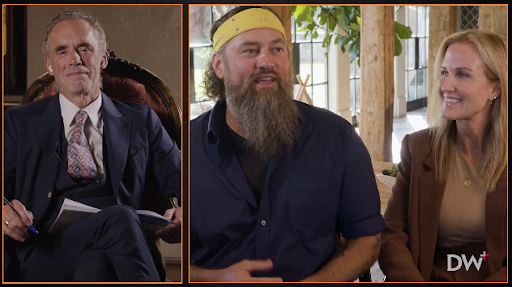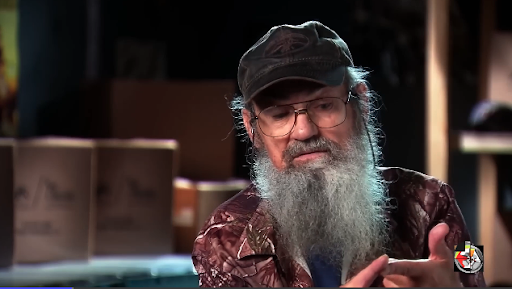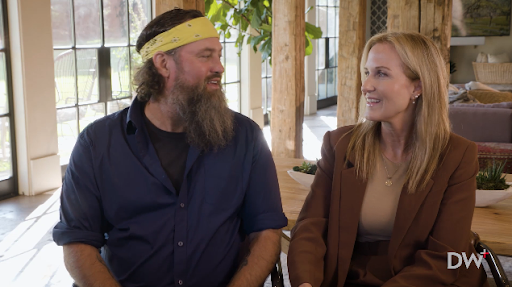The following is a transcript excerpt from Dr. Jordan Peterson’s conversation with Willie and Korie Robertson. In this segment, they discuss dinner-time meals with family, what resonated with “Duck Dynasty” viewers, and the reality of their television show. You can listen to or watch the full podcast episode on DailyWire+.
Start time: 1:35
Jordan: Why do you think that what you did struck a chord with people so deeply and one that was able to be maintained?
Willie: Well, I think there’s probably a couple reasons for that. I think people saw parts of their family in our family, and so I think it resonated especially across generations. [We] just had a lot of people say, “Wow, my dad’s similar to your dad,” or “My mom’s just like your mom,” or “We’ve got a crazy uncle.” And so I think that was one of them. I think it was funny, and I think people like to laugh and have fun. And I also think the faith aspect was a big part of it with the prayer at the end. It wasn’t overtly religious, but it was wholesome I guess.

DailyWire+
Jordan: So what role do you think the faith played?
Korie: I actually think it played a really big role. I think that, you know, we ended every episode around the dinner table and we said a prayer. And we really didn’t have any grand scheme for that. We just did it because it’s kind of what our family does. And so we said a prayer and that just had such an impact on people. I feel like that’s the most common thing people commented on as we’ve traveled the world. It was just sitting around the table and being grateful for what’s before you. You know, it was just this idea that we would submit to God and give gratefulness, give thankfulness, to him before we have a meal.
And Willie mentioned that nostalgia. I think there was this [going] back to something that we’ve lost as a country, as a people. Whenever we did the show, I think that the network and the executives thought that we were going to look like this Louisiana family that’s so different and unique, and that we hunt for a living and we eat squirrels and all this, and that people would maybe look at us and be like, “Oh, they’re so different and outside of the norm,” or whatever. But instead, people actually looked at us and were like, “Oh, that’s like my family,” or “That’s like my family used to be,” or “That is something that I long for in our family is to be able to come together at the end of the day around the dinner table.”

DailyWire+.
Willie: I think in the aspect when you say, “That’s what we used to be,” if you’re sitting around a table where we ended every episode — I think people [saw] that, going, “Wow, we never sit together and eat. You know, we’re always running and gunning and grabbing fast food.” And so I think they saw that and were like, “Wow, maybe we did that at a holiday or growing up.”
And so that was one of the parts where, maybe they didn’t say a prayer or maybe they used to, and maybe they heard about it. So I think they kind of really enjoyed that, even if they don’t do it. Some of them did and said, “Hey, now we’ve changed our whole structure and now we sit down and we eat together.” But they could kind of see that, and so I do think it was kind of a throwback.
WATCH: The Jordan B. Peterson Podcast
Korie: It was really interesting to me because I think it was a funny show. It was like a sitcom. It was a funny show about our family, but it impacted people in really powerful ways. People would come up in tears saying, “Now my family eats dinner together because of your show.” Or, “My husband goes to church now because he saw real men that just love God and can be normal people,” or things like, “I watched it with my dad who had cancer, and it brought us joy and laughter and positivity and hope in a time that was the darkest time of our lives.”

DailyWire+.
Jordan: I remember I read a couple of years ago, I think, 30% of households in the U.K. now have no dining room table. So people don’t eat together. As a psychologist, it is very interesting to me to consider the role of the table in the union of families and in the socialization of children.
I mean, first of all, people, human beings, do something very strange at a table, and it’s so normal in some ways that no one notices it. But human beings are really the only animals that formally share food. It is a very strange thing to do. I mean, even if you have a dog that loves you, he is generally not that happy if you try to take his bone away in his dinner dish; the carnivore comes back out. The fact that people can actually share food and that they can do that even when they are hungry is really quite the miracle.
It is also the case that at the dinner table is when you get to share your day; you each get to talk and to listen. That is a very good place to inculcate manners into your children. It is a good place for everybody to keep track of everyone else and what is going on in their day and their week and so forth. And it is a good time for everyone to come together and discuss the separate elements of their life.
In the Old Testament, there is an immense emphasis on hospitality on the grounds of morality itself — hospitality to a stranger. But the same thing applies within your family. You said that your producers were convinced that your family, in some sense, would be an oddity [and] out of the norm. I guess one of the things they did not consider was that not only in some ways were you guys not out of the norm, but [you were] the actual norm. But even more than that, you represented a kind of nostalgic ideal. And obviously that was centered at least in part around the dinner table and around prayer.
Then you also said that the mealtime prayer gave you a chance to be grateful. That really struck me as interesting, too, because one of the things that people do not really understand about prayer — they think about it as a kind of a wish, let’s say — is that it is actually a practice. And you can practice being grateful. The reason you should practice being grateful is, first of all, you notice what you have to be grateful about. And if your foot is not caught in a bear trap while you are dying of cancer, you have plenty to be grateful for. And so practicing that makes you much more aware of it. But it is also a really good way of staving off resentment.
It’s striking to me how much impact the fact that you guys sat around the table and all talked together and that you started that off with a prayer of gratitude. It’s really striking to me how much of an effect that had on your audience and the fact that also people use that as a model. What did you conclude from that? It must have been surprising to you, right? To have that impact?
Willie: It really was because to us, it just seemed like a small part of life that we’ve done thousands of times. I guess I thought most people would be like, “Oh, they’re saying a prayer, and that’s what we all do.” And so [what] was striking to me is that a lot of people didn’t do that.
Or like I said, they used to do that or they didn’t do that [anymore]. And it had this big impact on them.
To hear the rest of the conversation, continue by listening or watching this episode on DailyWire+.
Dr. Jordan B. Peterson is a clinical psychologist and professor emeritus at the University of Toronto. From 1993 to 1998 he served as assistant and then associate professor of psychology at Harvard. He is the international bestselling author of Maps of Meaning, 12 Rules For Life, and Beyond Order. You can now listen to or watch his popular lectures on DailyWire+.

Continue reading this exclusive article and join the conversation, plus watch free videos on DW+
Already a member?

.png)
.png)

